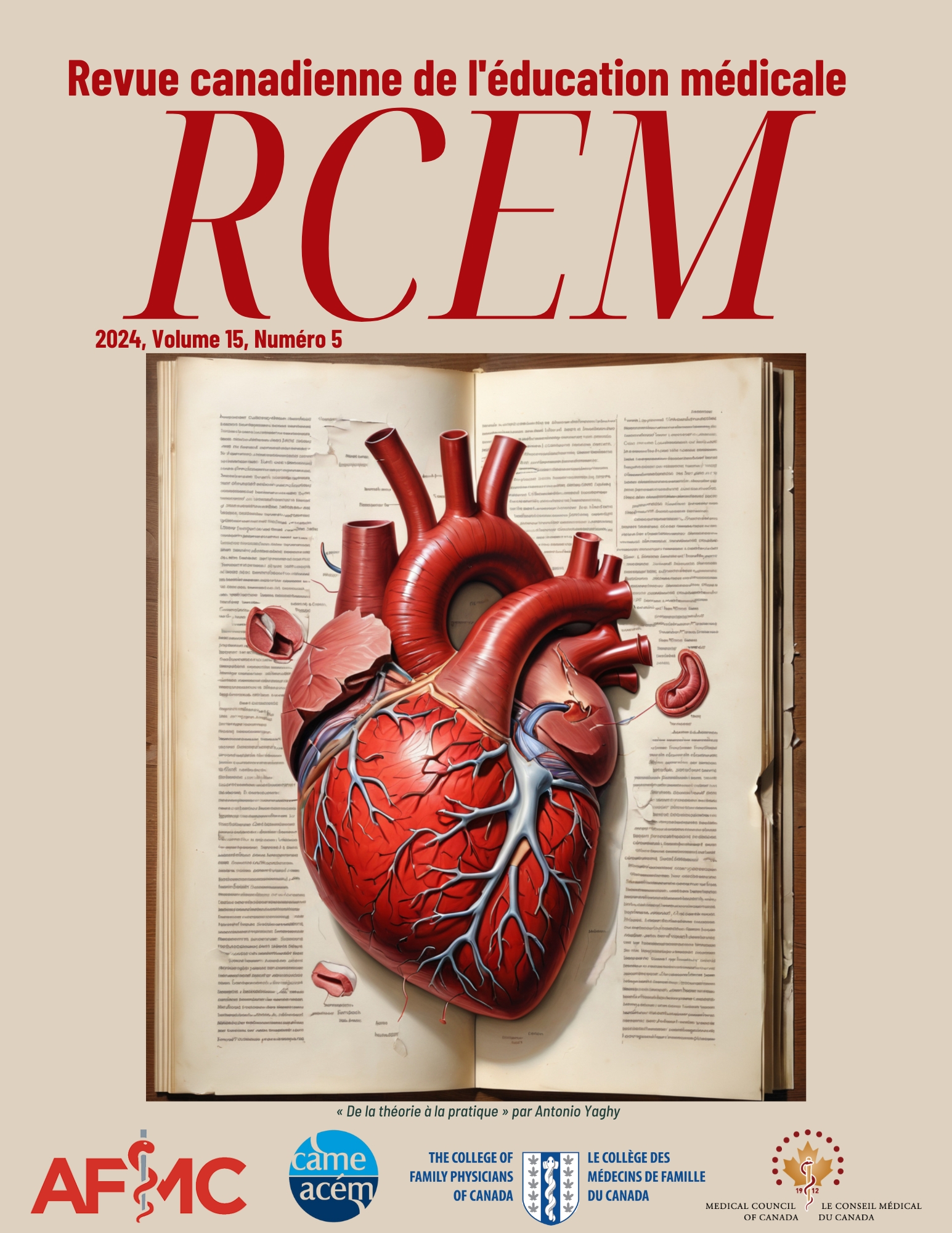Réflexions sur le développement professionnel continu dans l'ère post-pandémique : Expériences nationales en psychiatrie
DOI :
https://doi.org/10.36834/cmej.77048Résumé
Introduction : La COVID-19 a entraîné des innovations rapides dans le domaine du développement professionnel continu (DPC). Nous avons mené des entrevues avec les directeurs du DPC en psychiatrie au Canada afin de comprendre l'impact de la pandémie et d'identifier les pratiques efficaces.
Méthodes : À l'automne 2021, un questionnaire de 31 questions accessible en ligne a été créé selon un mode itératif basé sur des discussions entre les éducateurs du DPC et diffusée aux responsables des programmes de DPC de 17 facultés de médecine canadiennes par l'intermédiaire du Conseil de formation continue en psychiatrie (CFCP). Nous avons recueilli des données sur chaque programme de DPC, sur les modifications liées aux restrictions pandémiques et sur les intentions concernant la prestation future d’activités de DPC.
Résultats : Nous avons reçu au total neuf réponses. La COVID-19 a mené à une transition vers la prestation de DPC en mode virtuel, avec des stratégies créatives et novatrices pour maintenir l'engagement et la sécurité en ligne. Le DPC virtuel a été associé à une augmentation de la participation et à une diminution des coûts. De nombreux répondants prévoient que les modalités virtuelles ou hybrides se poursuivront après la COVID-19.
Conclusion : La pandémie a entraîné une transition vers la prestation virtuelle de programmes de DPC en psychiatrie. La prestation hybride sera probablement le mode prédominant des futurs programmes de DPC, ce qui nécessitera davantage de ressources technologiques, financières et humaines pour relever les défis potentiels. En période d'adaptation rapide, un réseau national de directeurs de DPC peut constituer un lieu important d'échange de connaissances sur les innovations et les pratiques efficaces et renforcer la capacité d'expertise.
Références
Mack HG, Filipe HP. Clinical teaching of CPD during the COVID pandemic. Clin Teach. 2021;18(1):84-86. https://doi.org/10.1111/tct.13261
Tarchichi TR, Szymusiak J. Continuing Medical Education in the time of social distancing: the case for expanding podcast usage for continuing education. J Cont Educ Health Prof. 2021;41(1):70-74. https://doi.org/10.1097/CEH.0000000000000324
Sklar D, Yilmaz Y, Chan TM. What the COVID-19 pandemic can teach health professionals about Continuing Professional Development. Acad Med. 2021;96(10):1379-1382. https://doi.org/10.1097/ACM.0000000000004245
Thomas PA, Kern DE, Hughes MT. Curriculum Development for Medical Education : A Six-Step Approach. 4th ed. Baltimore: Johns Hopkins University Press; 2022.
Kimmons R, Graham C, West R. The PICRAT model for technology integration in teacher preparation. Contemp Issues Technol Teach Educ. 2020;20(1):176-198
MacNeill H, Masters K, Nemethy K, Correia R. Online learning in Health Professions Education. Part 1: Teaching and learning in online environments: AMEE Guide No. 161. Med Teach. 2023 Apr 24:1-14. https://doi.org/10.1080/0142159X.2023.2197135
Kawczak S, Fernandez A, Frampton B, et al. Observations from transforming a Continuing Education programme in the COVID-19 era and preparing for the future. J Euro CME. 2021;10(1):1964315. https://doi.org/10.1080/21614083.2021.1964315
Harissi-Dagher M. COVID-19 and continuing professional development: an opportunity for inclusion. Can J Ophthamol. 2021;56(1):2-3. https://doi.org/10.1016/j.jcjo.2020.12.012
Moyle A, Ross S, Jones M, Zhou J, Fitzpatrick C, Richardson D. Education Hour: online sexual health continuing professional development during the COVID-19 pandemic provides opportunities and inclusivity. Sex Trans Infect. 2021;97(5):391. https://doi.org/10.1136/sextrans-2020-054872
Cheng C, Papadakos J, Umakanthan B, Fazelzad R, Martimianakis MA, Ugas M, et al. On the advantages and disadvantages of virtual continuing medical education: a scoping review. Can Med Educ J. 2023;14(3):41-74. https://doi.org/10.36834/cmej.75681
Attenborough P, Towns J, Fazalbhoy A, Fitzgerald K. Clinical assessment during a global pandemic - Transitioning to a COVID safe hybrid OSCE. Intern J Osteo Med. 2021;42:1-4. https://doi.org/10.1016/j.ijosm.2021.10.004
Rao S, Chowdhury N, Naithani M, et al. Alternative strategy adopted in practical assessment for pathology postgraduate certification examination amidst COVID-19 nationwide lockdown: an Indian experience with a novel hybrid method of assessment. Adv Med Educ Pract. 2021;12:1-9. https://doi.org/10.2147/AMEP.S286423
Smith M, Rumoro A, Staffileno BA. Favorable Outcomes: Moving nursing orientation to a hybrid program during the COVID-19 pandemic. J Nurses Prof Dev 2022;38(1):E5-E11. https://doi.org/10.1097/NND.0000000000000833
Han JK, Baykaner T, DeSimone CV, et al. Virtual transformation and the use of social media: cardiac electrophysiology education in the post-COVID-19 era. Curr Treat Options Cardio Med. 2021;23(11):70. https://doi.org/10.1007/s11936-021-00948-9
Téléchargements
Publié
Versions
- 2024-11-12 (2)
- 2024-10-17 (1)
Numéro
Rubrique
Licence
© Lara Hazelton, Certina Ho, Owen Connolly, Christy Mak, Eulaine Ma, Wei Wei, Heather E McNeely, Heather Milliken, Rajeevan Rasasingham, Sanjeev Sockalingam 2023

Cette œuvre est sous licence Creative Commons Attribution - Pas d'Utilisation Commerciale - Pas de Modification 4.0 International.
La soumission d’un manuscrit original à la revue constitue une indication qu’il s’agit d’un travail original, qu’il n’a jamais été publié et qu’il n’est pas envisagé pour publication dans une autre revue. S’il est accepté, il sera publié en ligne et ne pourra l’être ailleurs sous la même forme, à des fins commerciales, dans quelque langue que ce soit, sans l’accord de l’éditeur.
La publication d’une recherche scientifique a pour but la diffusion de connaissances et, sous un régime sans but lucratif, ne profite financièrement ni à l’éditeur ni à l’auteur.
Les auteurs qui publient dans la Revue canadienne d’éducation médicale acceptent de publier leurs articles sous la licence Creative Commons Paternité - Pas d’utilisation commerciale, Pas de modification 4.0 Canada. Cette licence permet à quiconque de télécharger et de partager l’article à des fins non commerciales, à condition d’en attribuer le crédit aux auteurs. Pour plus de détails sur les droits que les auteurs accordent aux utilisateurs de leur travail, veuillez consulter le résumé de la licence et la licence complète.











